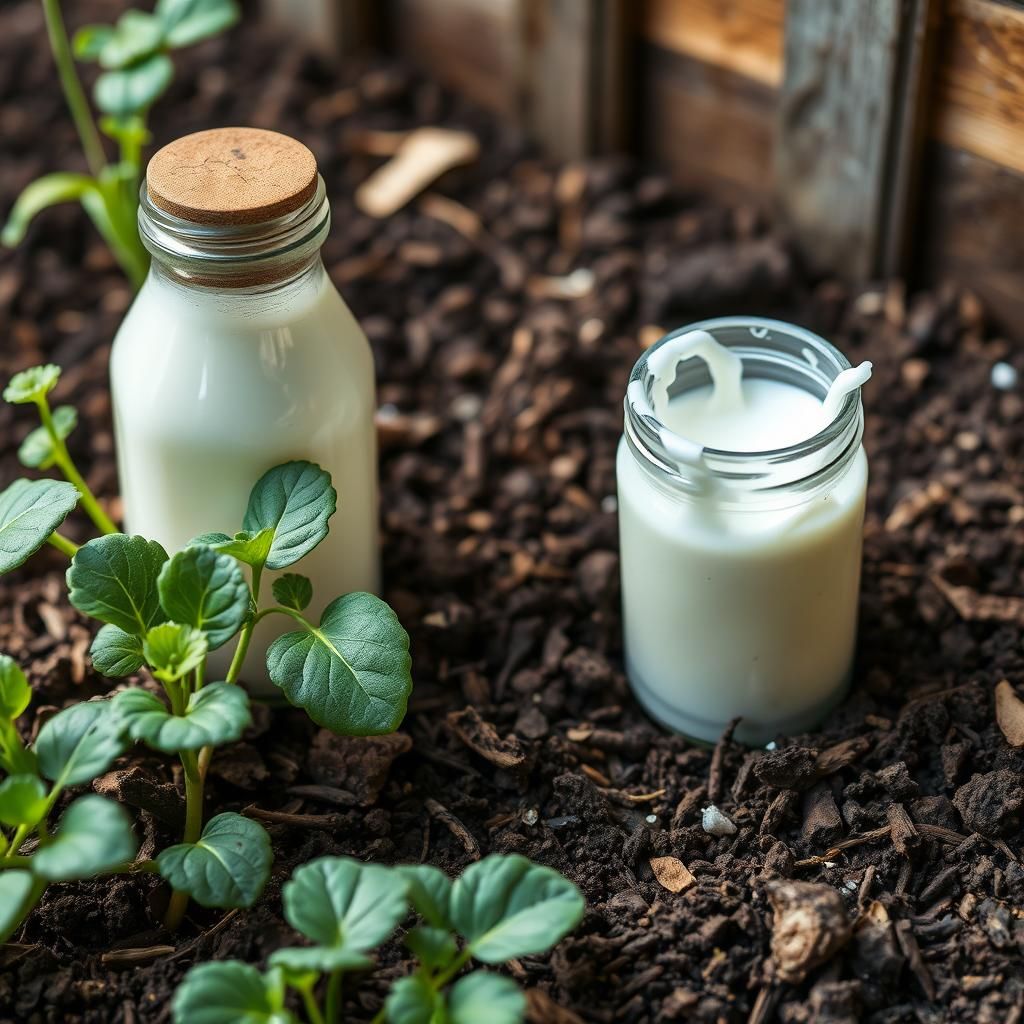Can You Put Expired Milk in Compost? Tips and Benefits for Your Garden

When it comes to composting, many wonder if expired milk can be a valuable addition to their organic garden waste. While the idea of adding spoiled dairy might seem unconventional, it offers unique benefits for soil health and plant growth. This article will explore the effectiveness of incorporating expired milk into compost, offering practical tips on how to do so safely. We'll discuss the nutritional advantages it brings to your compost pile, the potential drawbacks, and how to ensure your garden flourishes. Discover how this often-overlooked ingredient can transform your composting experience and contribute to a thriving garden.
Can You Put Expired Milk in Compost?
Yes, you can put expired milk in compost, as it can provide valuable nutrients to your compost pile. However, moderation is key, as too much milk can create an imbalance in your compost. The presence of dairy can promote the growth of certain bacteria, which may lead to unpleasant odors, attracting pests like rodents or flies. It's recommended to mix expired milk with other carbon-rich materials such as straw or dry leaves to help balance the nitrogen content and to ensure proper aeration and decomposition in the compost.
Nutritional Benefits of Milk in Compost
Expired milk can add significant amounts of nutrients to compost, particularly nitrogen. Nitrogen is an essential component for microbial growth, which helps break down organic material. Including dairy can boost the overall nutrient profile of the compost, providing important elements like calcium and phosphorus that plants need for healthy growth.
Potential Issues with Dairy in Compost
Despite its benefits, adding dairy such as expired milk can lead to potential issues within the compost pile. The most immediate concern is the odor that can arise from anaerobic decomposition if not properly balanced with carbon-rich materials. This odor can attract unwanted pests, which can be a significant drawback for gardeners looking to maintain a healthy and clean compost environment.
How to Compost Expired Milk
To compost expired milk effectively, it’s best to dilute it with water or mix it with dry materials to distribute its moisture evenly throughout the pile. Adding small amounts at a time while ensuring a good mix with carbon-rich materials can help maintain a balanced compost environment. Turning the compost regularly aids in aeration, which prevents odors and promotes faster decomposition.
Alternatives to Composting Expired Milk
For those who are hesitant to compost expired milk due to the potential for odor and pest attraction, there are alternatives. Expired milk can be used directly in the garden as a soil amendment, providing nutrients directly to the plants. Another option is to use it in vermicomposting, as worms can thrive on milk products, but again, moderation is essential to avoid creating an unsuitable environment.
Best Practices for Composting Dairy Products
If you decide to compost dairy products like expired milk, there are specific best practices to follow. It's advisable to always balance dairy with an adequate amount of browns (carbon-rich materials) to offset the nitrogen levels. Regularly turning the compost pile helps aerate it to minimize odors and maintain moisture levels. Monitoring the compost for signs of pest attraction or unpleasant odors will allow for timely adjustments.
| Material | Type | Benefits |
|---|---|---|
| Expired Milk | Dairy | Source of nitrogen, calcium, and phosphorus |
| Straw | Carbon | Balances nitrogen in compost, reduces odors |
| Dry Leaves | Carbon | Enhances air circulation, adds valuable nutrients |
| Kitchen Scraps | Nitrogen | Variety of nutrients for balanced compost |
| Grass Clippings | Nitrogen | High in nitrogen, encourages microbial activity |
Can you compost expired milk?

Yes, you can compost expired milk, but there are certain factors to consider to ensure that the composting process is effective and does not produce unpleasant odors or attract pests. Dairy products, including milk, add valuable nutrients to compost, such as proteins and fats, but they also require careful management to avoid issues during decomposition. Here’s a detailed look at the composting of expired milk.
Benefits of Composting Expired Milk
Composting expired milk can provide several benefits that enhance the quality of your compost and support the environment:
- Nutrient-Rich Addition: Expired milk contains calcium, phosphorus, and nitrogen, which can help to improve the nutrient profile of your compost.
- Organic Matter: The inclusion of dairy products promotes the enhancement of organic matter, which is essential for improving soil structure.
- Microbial Activity: Dairy can stimulate the growth of beneficial microorganisms within the compost, aiding the breakdown of other materials.
How to Properly Compost Expired Milk
To compost expired milk properly, it’s important to follow specific guidelines that ensure a successful decomposition process:
- Start Small: Begin with a small amount of milk to monitor the composting system’s reaction, avoiding overwhelming it.
- Mix Thoroughly: Blend the milk with carbon-rich materials such as dry leaves, straw, or cardboard to balance nitrogen levels.
- Maintain Moisture Levels: Ensure that the compost pile remains moist but not overly wet, as excess liquid can lead to odors and slow down decomposition.
Potential Issues with Composting Expired Milk
While composting expired milk can be beneficial, there are potential issues you may encounter, including:
- Odor Problems: If not managed correctly, expired milk can produce unpleasant odors due to the breakdown of fats and proteins.
- Pest Attraction: Dairy products can attract pests, including rodents and insects, if added in large quantities.
- Disease Risk: There is a risk of introducing pathogens into your compost if the milk is contaminated, which can affect the safety of the compost.
Composting Alternatives for Expired Milk
If you are hesitant to compost expired milk directly into your pile, consider these alternatives:
See also:
- Dilute with Water: Mix expired milk with water to create a diluted liquid fertilizer that can be applied directly to soil plants.
- Add to Bokashi: Use the milk within a Bokashi composting system, as it specializes in fermenting organic waste.
- Liquid Fertilizer: Use the expired milk as a liquid fertilizer for gardens or potted plants, ensuring it’s diluted appropriately.
Best Practices for Composting Dairy Products
To effectively compost dairy products, including expired milk, follow these best practices:
- Limit Dairy Use: Use dairy in moderation to prevent overwhelming the compost system and to avoid odor issues.
- Monitor Temperature: Keep an eye on the temperature of the compost pile, as higher temperatures help break down dairy more effectively.
- Use Aeration: Regularly aerate the compost pile to encourage aerobic decomposition and minimize foul smells caused by anaerobic conditions.
What can you do with expired milk?

Expired milk can still have several uses beyond being discarded. While one should not consume expired milk if it appears spoiled, there are various creative and practical applications for it. Here are some ideas:
1. Use it in Baking
Expired milk can be used as an ingredient in baking, particularly in recipes for pancakes, muffins, and bread. The acidity in the milk can react with baking soda or baking powder, adding fluffiness and depth of flavor.
- Buttermilk Substitute: You can create a buttermilk substitute by mixing expired milk with vinegar or lemon juice.
- Pancakes and Waffles: Incorporate it into pancake or waffle batter for a delicious, tender texture.
- Bread Recipes: Use it in quick bread recipes, where the milk's acidity enhances the rise.
2. Fertilizer for Plants
Expired milk can benefit your garden as a natural fertilizer. It contains essential nutrients that can promote plant growth and improve soil quality.
- Calcium Source: The calcium in milk helps strengthen plants and improve root development.
- Bacterial Growth: It can encourage beneficial bacteria in the soil, aiding the decomposition process.
- Application Methods: Dilute expired milk with water before applying it to plants to avoid overpowering the soil.
3. Skin Care Treatments
Using expired milk for skin care can be surprisingly beneficial. The lactic acid in milk acts as a gentle exfoliant and can help moisturize the skin.
- Facial Masks: Mix expired milk with honey or oatmeal for a moisturizing mask.
- Bath Soaks: Add expired milk to your bath for a soothing, skin-softening experience.
- Exfoliation: Use it as a gentle scrub by mixing it with sugar or salt.
4. Cleaning Agent
Expired milk can also be used as a natural cleaning agent. Its acidic properties help break down stains and food residue.
- Stain Remover: Use it to remove protein-based stains like blood or grass from fabrics.
- Surface Cleaner: Apply it to kitchen surfaces to help eliminate odors and residues.
- Glass Cleaner: The proteins in milk can leave glass surfaces streak-free when polished.
5. Animal Feed
If you have pets or farm animals, expired milk can be a nutritious addition to their diet. However, it should be fed in moderation and only if it shows no signs of spoilage.
- Dogs and Cats: Some pets can safely consume small amounts of expired milk as a treat.
- Livestock: Cows, pigs, and chickens can benefit from the nutrients in expired milk.
- Mixing in Feed: Combine it with animal feed to enhance nutritional value.
Is expired milk good for soil?

Expired milk can indeed be beneficial for soil when used correctly. The nutritional composition of milk makes it a potential resource for enhancing soil quality. While expired milk is not safe for human consumption, it can enrich the soil due to its nutritional content, including proteins, fats, and various micronutrients. These components can promote soil health and microbial activity.
Nutritional Benefits of Expired Milk for Soil
Expired milk contains several valuable nutrients that can improve soil quality. These include:
- Nitrogen: Milk is rich in protein, which breaks down into nitrogen, an essential nutrient for plant growth.
- Calcium: The calcium in milk can help improve soil structure and reduce compaction.
- Microbial Activity: The proteins and fats in expired milk can encourage beneficial microbes that aid in nutrient cycling.
How to Use Expired Milk in Gardening
Using expired milk in your garden can be straightforward but requires some caution. Here are some methods:
- Dilution: Always dilute expired milk with water (1 part milk to 4 parts water) to avoid overwhelming the plants with nutrients.
- Application Method: Apply it directly to the soil around plants or use as a foliar spray, which can help with nutrient absorption.
- Timing: Use expired milk during the growing season for maximum benefit to plants that are actively absorbing nutrients.
Potential Risks of Using Expired Milk
While expired milk has benefits, certain risks come with its usage:
See also:
- Odor: Expired milk can produce an unpleasant smell, especially if used in excess or improperly.
- Pest Attraction: The nutrients in milk can attract pests or rodents if not managed carefully.
- Soil Imbalance: Excess dairy can lead to an imbalance of nutrients, potentially harming plant health.
Comparing Expired Milk to Other Organic Fertilizers
Expired milk is one of many organic fertilizers available, each with unique advantages:
- Compost: Unlike expired milk, compost offers a more balanced nutrient profile and helps improve soil structure.
- Bone Meal: This is a slow-release source of phosphorus, unlike the rapid nutrient release from milk.
- Fish Emulsion: Fish emulsions provide a different set of nutrients and may be better for specific crops compared to milk.
Microbial Interaction with Expired Milk
The interaction between expired milk and soil microbes is significant:
- Beneficial Bacteria: The organic matter in expired milk can promote growth in beneficial bacteria that improve soil health.
- Soil Aeration: Microbial activity can increase soil aeration, enhancing root growth and nutrient uptake.
- Decomposition: Organic materials in milk aid in the decomposition process, releasing nutrients back into the soil.
Is spoiled milk a useful compost ingredient?

Spoiled milk can indeed be a useful ingredient in composting, provided it is used correctly. While spoiled milk is often considered waste, it can add valuable nutrients to the compost pile. Here’s a detailed look at how spoiled milk impacts compost:
Adding spoiled milk to your compost introduces various beneficial components to the organic matter. Milk contains proteins, fats, and sugars that can help boost the microbial activity within your compost, enhancing decomposition. Additionally, the presence of calcium and other minerals found in milk provides essential nutrients for the plants that will benefit from the compost.
Benefits of Using Spoiled Milk in Compost
There are several benefits to using spoiled milk as part of your composting strategy:
- Nutrient-Rich Addition: Spoiled milk is loaded with nutrients like nitrogen, which is crucial for plant growth.
- Microbial Growth Enhancement: The sugars and proteins in milk promote the growth of beneficial bacteria and fungi, accelerating the decomposition process.
- Improved Soil Structure: The fats in milk can help improve the soil's texture, making it more workable for plants.
How to Use Spoiled Milk in Compost
To incorporate spoiled milk into your compost effectively, consider the following methods:
- Mix with Dry Ingredients: Combine spoiled milk with dry materials like leaves, straw, or cardboard to balance moisture levels.
- Dilute with Water: Mix spoiled milk with water before adding it to your compost to prevent any unpleasant odors.
- Add in Moderation: Limit the amount of spoiled milk to avoid overwhelming your compost with liquid, aiming for about one cup per compost batch.
Potential Drawbacks of Using Spoiled Milk
While spoiled milk has advantages, there are potential drawbacks to consider:
- Odor Issues: Spoiled milk can produce a strong odor if not balanced properly with dry ingredients.
- Pest Attraction: The smell may attract rodents or other pests if too much is added to the compost pile.
- Imbalance in Composting: Excessive liquid can lead to waterlogged conditions, hindering the composting process.
Alternatives to Spoiled Milk in Compost
If you're hesitant about using spoiled milk in compost, consider these alternatives:
- Yogurt or Sour Cream: These dairy products can also provide beneficial bacteria and nutrients.
- Animal Manure: Rich in nitrogen, it can serve as a potent ingredient for compost.
- Plant-Based Sources: Use materials like legumes or other protein-rich plant items to achieve similar benefits.
Conclusion on Spoiled Milk as Compost Ingredient
In summary, spoiled milk has its place in composting when used appropriately. By understanding the benefits, methods of use, potential drawbacks, and alternatives, composters can make informed decisions about incorporating this ingredient into their composting practices.
Questions from Our Readers
Can I compost expired milk?
Yes, you can compost expired milk, but it should be done in moderation. Milk is a dairy product that can add valuable nutrients to your compost. However, it can also attract pests and produce unpleasant odors, so it's essential to mix it well with other materials and ensure proper aeration.
What happens if I add too much expired milk to my compost?
Adding too much expired milk can lead to composting issues such as bad odors and a slower breakdown process. The excess liquid can create a soggy environment that discourages the growth of beneficial microorganisms, resulting in ineffective compost.
Is it safe to use compost that contains expired milk?
It is generally safe to use compost that contains expired milk as long as it is properly decomposed. The composting process will break down the milk, eliminating harmful bacteria and pathogens, making it safe for use in your garden.
See also:
How can I balance the addition of expired milk in my compost?
To balance the addition of expired milk, consider adding high-carbon materials like dried leaves, straw, or shredded paper to absorb excess moisture. This will help maintain a good carbon-to-nitrogen ratio and ensure effective composting.

If you want to read more articles like Can You Put Expired Milk in Compost? Tips and Benefits for Your Garden, we recommend you check out our Compost category.
Leave a Reply
Related Articles